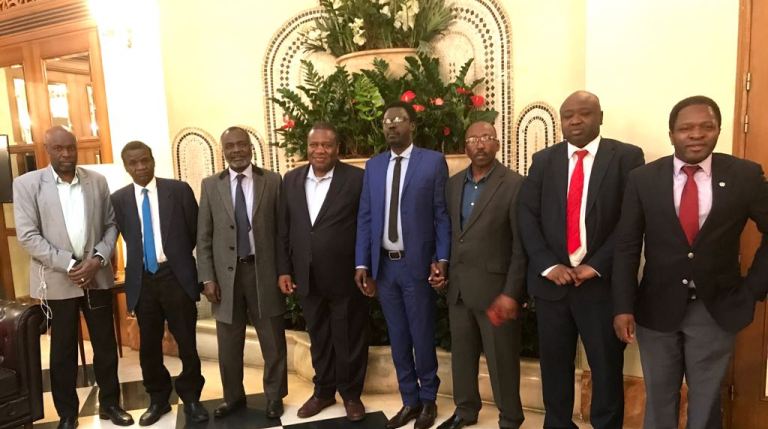JEM and SLM-MM hand over position paper on how to negotiate peace in Darfur

May 3, 2017 (PARIS) – The Sudan Liberation Movement led by Minni Minnawi (SLM-MM) and the Justice and Equality Movement (JEM) led by Gibril Ibrahim have handed over on Wednesday to Darfur Joint Chief Mediator (JCM) a position paper on how and what they want to negotiate to achieve peace in the western Sudan region of Darfur.
In August 2016, the two holdout groups failed to reach a humanitarian cessation of hostilities with the government as they insisted on the need to clearly include that the political talks would not be based on the Doha Document for Peace in Darfur (DDPD).
Since, the two armed movement held a series of meetings in Paris and Doha with the Qatari mediator, the head of UNAMID and former U.S. special envoy to define “how such a negotiation process for Darfur would operate and how it will relate to the ongoing AUHIP Roadmap Agreement process for resolving both the Darfur and Two Areas conflicts”.
SLM chairman Minni Minnawi told Sudan Tribune that Paris meeting with JCM Jeremiah Kingsley Mamabolo who is also the UNAMID chief is an extension of previous discussions with the former U.S. envoy, Qatari mediation and UNAMID “to find a solution to revive the Doha process for peace” in Darfur.
In a separate statement to Sudan Tribune, JEM leader Gibril Ibrahim added that this meeting with Mamabolo comes after a meeting held in Doha last December including the Qatari mediator, Sudanese government, UNAMID and former US special envoy.
He added the participants agreed not to reopen or amend the DDPD but “to negotiate with the non-signatory movements a peace agreement that would be attached as a supplemental protocol to the framework agreement of July 2011”.
Ibrahim further stressed that this “annexe or protocol formally preserves the parties to the DDPD, but in practice, it is a new agreement with new parties, mechanisms and timetables”.
The African Union High-Level Implementation Panel (AUHIP) in coordination with the JCM mediates a two-track process in order to achieve a holistic peace in Sudan and paves the way for constitutional reforms.
The holdout groups refuse the DDPD saying they want to discuss security and protection of civilians, compensations, landownership, and justice. They point that the Doha document omitted to address these issues in the right way.
However, Khartoum says the DDPD is now part of the constitution, and it cannot be changed. They say the armed groups have to sign it and renegotiate what they want to improve it.
SLM leader Minnawi emphasised that they welcome the Qatari efforts to bring peace in Darfur and they do not mind that Doha is the venue of the talks.
“The problem is not on the venue of negotiations, provided we discuss several procedural issues that will pave the way for confidence-building the government regarding the negotiation methodology, the parties and partners, the role of the mediator and facilitators,” he said.
He added the purpose of this meeting is to have the opportunity to prepare their position paper on all these procedural matters to avoid any difference in the future.
“The negotiations will not be based on the Doha document because the two movements were not part of it. Also, the DDPD is over and the Emir of Qatar came to Darfur and buried the document in a large ceremony, but they still insist on it as the Camp David (Accords),” Minniaw further stressed.
JEM and SLM-MM position paper seen by Sudan Tribune underlines the need to address procedural aspects of the negotiations citing the parties participating in the process, structure and format of the negotiations, including roles for the mediators and facilitators, timeline and agenda for negotiations, and How the Darfur negotiations will relate to the broader peace and political transition.
The two groups further say that an agreement on a negotiation process must enable the parties to resume negotiations on substantive issues, including a humanitarian cessation of hostilities, addressing the root causes of the conflict, resolving its consequences, recovery and development, return of refugees and displaced persons, justice, and reconciliation, land, and settlement, and compensation.
The two leaders disclosed that they have renewed the unilateral cessation of hostilities for an additional six-month period from 3 May to 2 November 2017.
(ST)
